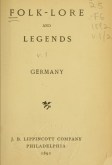Peter Klaus
German Folktale
Peter Klaus, a goatherd of Sittendorf, who tended herds on the Kyffhauser mountain, used to let them rest of an evening in a spot surrounded by an old wall, where he always counted them to see if they were all right. For some days he noticed that one of his finest goats, as they came to this spot, vanished, and never returned to the herd till late. He watched him more closely, and at length saw him slip through a rent in the wall. He followed him, and caught him in a cave, feeding sumptuously upon the grains of oats which fell one by one from the roof. He looked up, shook his head at the shower of oats, but, with all his care, could discover nothing further. At length he heard overhead the neighing and stamping of some mettlesome horses, and concluded that the oats must have fallen from their mangers.
While the goatherd stood there, wondering about these horses in a totally uninhabited mountain, a lad came and made signs to him to follow him silently. Peter ascended some steps, and, crossing a walled court, came to a glade surrounded by rocky cliffs, into which a sort of twilight made its way through the thick-leaved branches. Here he found twelve grave old knights playing at skittles, at a well-levelled and fresh plot of grass. Peter was silently appointed to set up the ninepins for them.
At first his knees knocked together as he did this, while he marked, with half-stolen glances, the long beards and goodly paunches of the noble knights. By degrees, however, he grew more confident, and looked at everything about him with a steady gaze—nay, at last, he ventured so far as to take a draught from a pitcher which stood near him, the fragrance of which appeared to him delightful. He felt quite revived by the draught, and as often as he felt at all tired, received new strength from application to the inexhaustible pitcher. But at length sleep overcame him.
When he awoke, he found himself once more in the enclosed green space, where he was accustomed to leave his goats. He rubbed his eyes, but could discover neither dog nor goats, and stared with surprise at the height to which the grass had grown, and at the bushes and trees, which he never remembered to have noticed. Shaking his head, he proceeded along the roads and paths which he was accustomed to traverse daily with his herd, but could nowhere see any traces of his goats. Below him he saw Sittendorf; and at last he descended with quickened step, there to make inquiries after his herd.
The people whom he met at his entrance to the town were unknown to him, and dressed and spoke differently from those whom he had known there. Moreover, they all stared at him when he inquired about his goats, and began stroking their chins. At last, almost involuntarily, he did the same, and found to his great astonishment that his beard had grown to be a foot long. He began now to think himself and the world altogether bewitched, and yet he felt sure that the mountain from which he had descended was the Kyffhauser; and the houses here, with their fore-courts, were all familiar to him. Moreover, several lads whom he heard telling the name of the place to a traveller called it Sittendorf.
Shaking his head, he proceeded into the town straight to his own house. He found it sadly fallen to decay. Before it lay a strange herd-boy in tattered garments, and near him an old worn-out dog, which growled and showed his teeth at Peter when he called him. He entered by the opening, which had formerly been closed by a door, but found all within so desolate and empty that he staggered out again like a drunkard, and called his wife and children. No one heard; no voice answered him.
Women and children now began to surround the strange old man, with the long hoary beard, and to contend with one another in inquiring of him what he wanted. He thought it so ridiculous to make inquiries of strangers, before his own house, after his wife and children, and still more so, after himself, that he mentioned the first neighbour whose name occurred to him, Kirt Stiffen. All were silent, and looked at one another, till an old woman said—
"He has left here these twelve years. He lives at Sachsenberg; you'll hardly get there to-day."
"Velten Maier?"
"God help him!" said an old crone leaning on a crutch. "He has been confined these fifteen years in the house, which he'll never leave again."
He recognised, as he thought, his suddenly aged neighbour; but he had lost all desire of asking any more questions. At last a brisk young woman, with a boy of a twelvemonth old in her arms, and with a little girl holding her hand, made her way through the gaping crowd, and they looked for all the world like his wife and children.
"What is your name?" said Peter, astonished.
"Maria."
"And your father?"
"God have mercy on him, Peter Klaus. It is twenty years since we sought him day and night on the Kyffhauser, when his goats came home without him. I was only seven years old when it happened."
The goatherd could no longer contain himself.
"I am Peter Klaus," he cried, "and no other," and he took the babe from his daughter's arms.
All stood like statues for a minute, till one and then another began to cry—
"Here's Peter Klaus come back again! Welcome, neighbour, welcome, after twenty years; welcome, Peter Klaus!"
Folk-lore and Legends: Germany

Notes: Contains 30 German folktales.
Author: Charles John Tibbitts
Published: 1892
Publisher: W. W. Gibbings, London